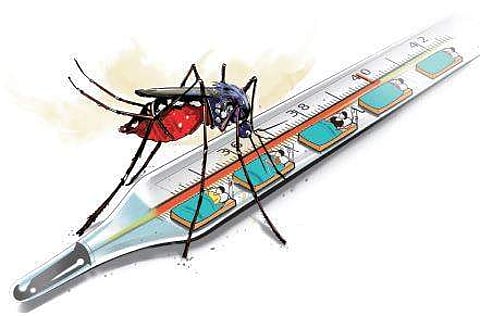'Global drive against malaria slows down, need to address stark inequities': WHO
NEW DELHI: Global efforts to reduce malaria have stagnated, posing a significant threat to public health and exacerbating inequalities within communities, even though the mosquito-borne disease affects nine out of eleven countries in the Southeast Asia region and accounts for a third of the global burden outside Africa, the WHO said Wednesday.
On World Malaria Day, observed on April 25, the World Health Organisation (WHO) said there is an urgent need to address the stark inequities in access to malaria prevention, detection, and treatment services.
“Malaria remains a significant public health challenge in our Region, affecting nine out of eleven countries and accounting for a third of the global burden outside Africa,” said Saima Wazed, WHO Regional Director for Southeast Asia Region (SEARO).
This time's World Malaria Day theme is accelerating the fight against malaria for a more equitable world.
The Regional Director said this can be achieved through ending discrimination and stigma, engaging communities in healthy decision-making, bringing healthcare close to where people live and working through primary health care, addressing factors that increase malaria risk and including malaria control interventions in universal health coverage.
Globally, four people die due to malaria every three minutes. In 2020, the Southeast Asia region was the second largest contributor of malaria cases worldwide after the African region, with around five million cases and 9000 deaths.
India accounted for 66% of malaria cases in the WHO South-East Asia Region in 2022. The World Malaria Report said that there is an estimated 33.8 lakh cases and 5,511 deaths in India in 2022.
India saw a decline of 30 per cent in malaria incidence and 34 per cent in mortality in 2022 compared to the previous year. India aims to eliminate malaria (zero indigenous cases) by 2030.
In 2020, 29 of the 85 malaria-endemic countries accounted for 96% of malaria cases. India contributed 1.7% of malaria cases and 1.2% of deaths globally.
The WHO SEARO head said everyone has the right to quality, timely, and affordable malaria services, yet this remains elusive for many, perpetuating a cycle of inequity that disproportionately affects the most vulnerable among us.
“Together, let us commit to accelerating the fight against malaria, forging partnerships, and implementing evidence-based strategies to achieve a more equitable world where no one is left behind in our quest to end malaria for good,” she added.
Infants and young children, especially those under five, are particularly affected, with disparities in access to education and financial resources compounding their risk.
Pregnant women also face heightened risks, as pregnancy reduces immunity to malaria, making them more susceptible to infection and severe disease.
“Gender inequalities, discrimination, and harmful gender norms further increase their vulnerability. Without timely and appropriate intervention, malaria in pregnancy can have devastating consequences, including severe anaemia, maternal death, stillbirth, premature delivery, and low-birth-weight babies,” she said.
Refugees, migrants, internally displaced people, and indigenous people are also at heightened risk of malaria, often excluded from disease control efforts and experiencing adverse conditions where malaria thrives, she further said.
Climate change and humanitarian emergencies exacerbate these challenges, displacing populations and making them more susceptible to the disease.
She noted that there has been some progress in recent years in the Region, which witnessed a substantial decline in malaria cases and deaths, marking the most significant reduction among all WHO regions.
She said much progress has been made by countries such as Bhutan, Nepal, and Timor-Leste, demonstrating that with political commitment and collective action, malaria elimination is within reach.
However, malaria elimination is far from over, she said.
On this occasion, WHO calls for renewed attention to the barriers to health equity, gender equality, and human rights in malaria responses.
“We must redouble our efforts to overcome these challenges and ensure that all individuals, regardless of their socio-economic status or geographical location, have access to life-saving malaria prevention, diagnosis, and treatment services,” the regional director said.
“Moreover, by leveraging digital technology, we can better understand the diverse health needs of populations, collect and analyse data, and monitor progress in real-time, enabling us to identify and address health inequities through proven interventions and innovation in service delivery,” she added.

